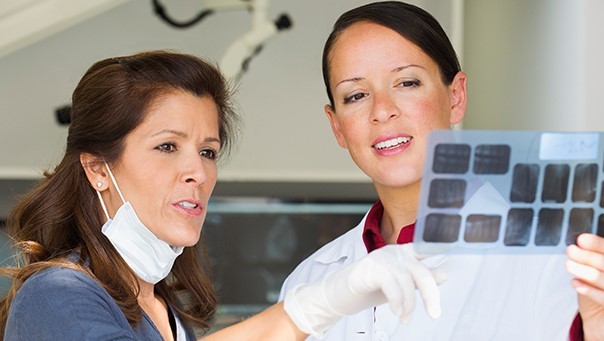-
-

BRUSHING & FLOSSING
How to BrushWhat Is the Right Way to Brush?
Proper brushing takes at least two minutes — that's right, 120 seconds!...

BRUSHING & FLOSSING
How To FlossWhat is the Right Way to Floss?
Proper flossing removes plaque and food particles in places where a toothbrush cannot easily reach... -
Science & Innovation
- Home
- Oral Health
- Tooth Extraction And Dry Sockets


Wisdom teeth, or third molars, are often extracted. Some people naturally have enough room in their mouths to accommodate the eruption of wisdom teeth. Those who do not have room for additional teeth may suffer impacted wisdom teeth, a condition in which the teeth remain buried (or partially buried) below the gums. Wisdom teeth may also erupt out of line with the rest of the teeth. Wisdom teeth impacted below the gum line may cause pain and swelling in the surrounding tissues.
When wisdom teeth – or any teeth – are extracted, several complications may occur after surgery, including:
· Dry Socket
· Nerve damage causing numbness of the lower lip or tongue
· Jaw stiffness
· Infection
· Bruising and /or haematoma
What is a Dry Socket?
After a tooth extraction, a blood clot forms in the tooth socket, the space that once held the tooth, and seals the area so that it can heal. A dry socket occurs when the blood clot breaks down or is dislodged, exposing the bone of the jaw. The first three or so days after extraction are the most critical, and it is during this time that the risk of developing a dry socket is the highest. A dry socket can be very painful! If you think you have this condition, contact your dentist immediately.
Treatment
Typically, your dentist will rinse out the empty socket, remove any debris and apply a medicated dressing to protect the area and decrease pain. If signs of widespread infection are present e.g. fever or general malaise, the dentist may also prescribe an antibiotic to prevent further spread of infection and a painkiller to ease discomfort. The dentist can advise you what to eat or drink as well as how to clean and care for the dry socket area. With proper care and rest, the dry socket should heal in seven to ten days. Your dentist will probably ask that you schedule a follow up appointment to monitor the healing process and to see how you are doing.
Related Articles

If you have been experiencing problems with a tooth, you may wonder, "Do I need a root canal filling?" Root canal fillings, also known as endodontic therapy, are performed when the nerve or pulp of the tooth becomes infected

When people are told that they need a root canal therapy, they often worry that it's going to be painful.

The goal of the root canal therapy is to save a tooth that is severely infected. As Dental Health Services Victoria puts it, a dentist performs the procedure to replace damaged or infected pulp in the tooth's root canal with a root filling.
This article is intended to promote understanding of and knowledge about general oral health topics. It is not intended to be a substitute for professional advice, diagnosis or treatment. Always seek the advice of your dentist or other qualified healthcare provider with any questions you may have regarding a medical condition or treatment.
Related Products

Helping dental professionals
More professionals across the world trust Colgate. Find resources, products, and information to give your patients a healthier future








